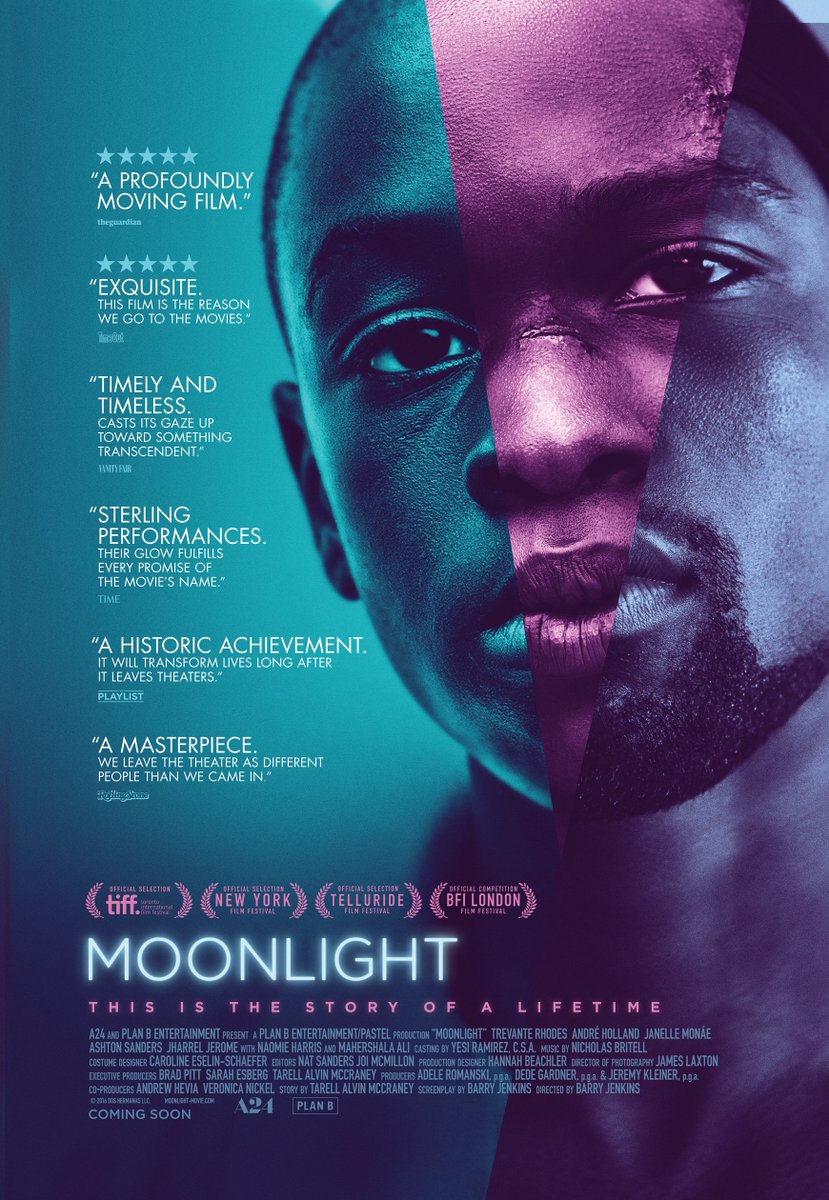Moonlight can be
seen as the polar opposite of other Oscar nominee Fences. Defiantly modern. Emotional and sensitive. Deftly handling
its themes and motifs. And cinematic to a tee. Plus both were based on plays (Moonlight being based on the
screenwriter’s play Moonlight Black Boys
Look Blue). Like Kendrick Lamar’s 2016 album, To Pimp A Butterfly, this feels like a state of nation address but
not in the way you would expect (both share a sampling of the same Boris
Gardiner song as their opening). Moonlight
is an emotional and powerful experience that becomes a universal story about
feeling like an outsider.
We follow the journey of Chiron, an outcast African-American
child struggling to grow up in a coming-of-age story set in Miami. The film is
split into three sections as we see Chiron grow up as played by three different
actors. We first meet Chiron as a child when he is widely known as “Little”.
Little is quiet and solemn, struggling with his loneliness, his addict mother
and making friends. He is found alone in an abandoned apartment by a drug
dealer named Juan, who takes Little under his wing to teach him about the ways
of the world. The second section deals with Chiron in high school, now besotted
by hormones, unreleased rage and coming to the realisation that he is
homosexual. This is probably the strongest section of the film as the emotions
feel raw and all too real. The final section sees Chiron as a young man, now
known as “Black”, who has become hardened and distant from the world. A chance
call from an old school friend (who also shared an intimate moment with Chiron)
brings him back to Miami to maybe face up to his wrought past and hidden
emotions.
Moonlight stands
out due to its visual style. Barry Jenkins and cinematographer James Laxton
resist a photo-realistic, faux-documentary style in favour of a stylised,
mellow, almost washed out blue palette, with some scenes intentionally out of
focus to evoke memories and the passage of time. To any cinephile that can't
accept digital filmmaking into their lives, I beg them to look at this film.
This is the promise of digital filmmaking. The filmmakers eschew normal genre
expectations – drug dealers and crack-head mothers are in the films but they
never fall into stereotypes. Surprisingly, it is also free of a rap heavy
soundtrack. The filmmakers are urging us to look past the cliches and our
pre-conceptions about these characters. The cast are presented as flawed
humans, struggling along with Chiron. Guns are in the film but they are never
used in a violent way, only to suggest and imply the life style these
characters are forced to lead. It’s a potentially hostile environment with
little room for escape.
Of course the best element of the film is the decision to
have three different actors play Chiron in the three segments. I wish an Oscar
could be given to all three of these actors for building up and continuing a
character arc that is sensitive, emotional and 100% absorbing. Alex Hubert
perfectly captures the traumatised innocent, wide-eyed yet withdrawn and quiet.
He delivers one of the most powerful moments in the film – when he finds out
his new father figure is a drug dealer and that his mother is an addict. Ashton
Saunders is gawky, gangly and outcast as teenage Chiron, who embodies the
hormonal frustration and anger of any teenager. Finally, Trevante Rhodes plays
Chiron, or “Black”, as a towering and hardened man who betrays elements of his
deeply hidden emotions. These are multi-faceted performances that are given
roughly equal screen time and allow us to completely understand and relate to
Chiron’s experience. Many have compared the style to Linklater’s Boyhood, which is
fair – whereas Boyhood was a massive
accomplishment on a technical and practical level, keeping the same cast for 12
years, I would argue that Moonlight
is more focused. That said, they do serve as nice companion pieces on the
experience of growing up American.
The other players in the film are those most important in
Chiron’s life. Juan, played by Mahershala Ali, tries to take “Little” under his
wings, teaching him important life lessons and hard truths about the world.
Ali’s performance is fatherly, eschewing normal expectations from this role to
reveal a tenderness rarely seen in this genre figure. Similarly, Naomie Harris,
as Chiron’s mother (who almost turned the script down due to the surface level
cliché of the character) is a similarly flawed human being – she is also clearly
fighting her inner demons but going about it in the wrong way. Her love for
Chiron often manifests itself in the wrong way. This is another multi-layered
performance that continues to reveal new depths throughout the chapters of the
film, especially in the final one.
Moonlight is an
unmissable film. The technique, acting and script all work together to build a
beautiful portrait of a man struggling with his deeply hidden emotions and
traumatic past. It urges us to look past stereotypes and search for true
identity. Everyone has a story. And everyone is shaped by their story. Thoroughly
modern and utterly compelling.
Rating: 10/10



Great review thanks
ReplyDelete